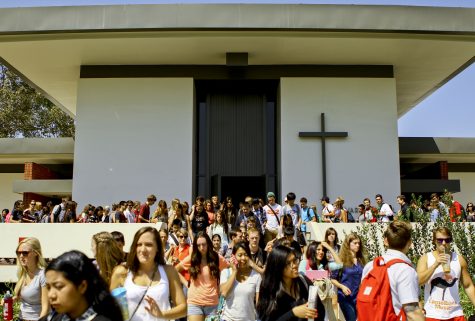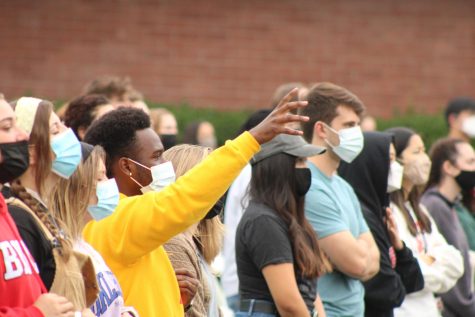Progressive pope provokes thought
Pope Francis’ recent discussions about controversial topics within the church affects how the world sees all Christians, including Protestants.
November 18, 2014
A five minute standing ovation erupted at the Synod Hall in Vatican City as Pope Francis stood before bishops clad in pink and red skullcaps, concluding the first major policy event of his papacy on Oct. 20, 2014. While events such as these seem detached from the Protestant church, the changing relationship between Christianity and modern debates bring up important conversations involving both Catholics and Protestants.
Media coverage centers on the controversial discussions of homosexuality and divorce within the Catholic Church. Pope Francis has brought forward many progressive viewpoints with a goal of reforming the Church and bringing about a sense of unity.
“So, the duty of the Pope is that of guaranteeing the unity of the Church,” Pope Francis said in an online article with Time magazine. “It is that of reminding the faithful of their duty to faithfully follow the Gospel of Christ — it is that of reminding the pastors that their first duty is to nourish the flock that the Lord has entrusted to them, and to seek to welcome — with fatherly care and mercy, and without false fears — the lost sheep.”
Despite some Catholic conservatives resisting change, the most prominent religious figurehead in the world acknowledges the immense pressure for progression. A shift in tone for treatment of a previously ostracized group brings homosexuality to the forefront of media coverage, affecting how people view the Protestants and Catholics.
“Many people think Francis is changing the Catholic view on homosexuality, but he is actually staying very close to official Catholic teaching,” said Gary Manning, associate professor of New Testament.
The Catholic Church believes in the sinfulness of homosexual acts, Manning said. However the fact that homosexual desire exists as a deep-seated tendency creates great difficulties for Catholics who want to obey God. But Catholics have to love homosexual people and avoid “every sign of unjust discrimination.” This follows directly with what the Catechism teaches.
“Francis is putting a little more emphasis on ‘homosexual people are loved by God and the church,’ while the Catholic Church has traditionally put more emphasis on ‘homosexual acts are sinful,’” Manning said.
The purveying attitude of acceptance is unanimously expected of the Protestant and Catholic communities. Most of these ideals reaffirm an old stance after decades of ignorance.
“The Pope has been mostly calling for a kinder, more accepting tone and attitude for the Roman Catholic Church and not a change to fundamental beliefs or morals,” Erik Thoennes, professor of Biblical studies said. “It seems to me that often those seeking changes in Roman Catholic teaching, so they align with contemporary sensibilities, have latched upon the Pope’s irenic tone and read doctrinal change into what he is saying, even though that is not what he intends.”
As the Catholic Church ascends into a new era of acceptance, it questions the effect this will have on Christian colleges and churches across the country, including how Biola should respond.
“Given that Biola is a parachurch organization I think that it is important for us to know what we stand for and stand against so that we are presenting a clear testimony to the world,” Greg Peters, associate professor of the Torrey Honors Institute said. “However, because Biola is not a church we do not have the same kind of pressure or responsibility on us as the church does to be definitive about particular issues.”
Peters said that as an intellectual community we can ask the kinds of questions and have the kinds of discussions not always open to churches.
Manning said we can learn positively from Francis’ acts of compassion, such as when he washed the feet of kids in a juvenile detention facility.
“As a church [and as a Christian university], we do a lot of good that often goes unnoticed by the world,” said Manning. “Wouldn’t it be nice if compassion for the needy was the first thing that people noticed about us?”







